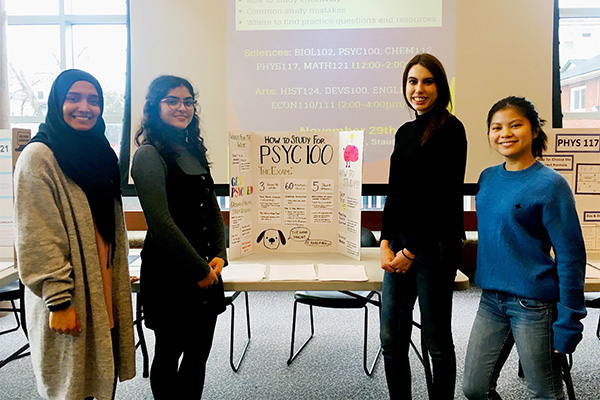Be exam ready with SASS Peers
December 7, 2018
Share

The peers at Student Academic Success Services (SASS) are an empathetic and helpful resource for students going into exams.
SASS peers are a group of 56 student volunteers who offer assistance to fellow students in all faculties and schools. Whether they are first-year students preparing for their first set of university exams, or upper years looking to improve their academic skills, this peer program provides students with opportunities to discuss and work through academic challenges with trained peers who have first-hand experience.
“The SASS peers have a connection to the first years,” says Ian Garner, Academic Skills Outreach Coordinator at SASS. “They understand what it’s like to be in that large lecture theatre for the first time. Many of our professional staff attended other universities, with smaller class sizes, and with different backgrounds, so peers are really invaluable to us.”
SASS offers two peer divisions to help ensure all students’ needs are met. Peer Learning Assistants (PLAs) promote learning strategies through workshops, one-on-one coaching and a variety of events and activities. Peer Writing Assistants (PWAs) help students develop their writing skills through individual consultations and writing workshops.
SASS peers have been hosting exam prep workshops at Stauffer Library, Queen’s University International Centre (QUIC), and in various residences. They also provide course-specific workshops, which supply focused and collaborative study strategies. For more tailored assistance, SASS provides one-on-one appointments with a PWA or PLA to help students work on effective study strategies and develop ideas for final papers. To lower exam stress and maximize study efforts, peers suggest that students create a study schedule and use self-testing as a way to assess strengths and weaknesses to prioritize review accordingly.
Over the fall term, SASS peers have managed close to 500 one-on-one appointments and have worked with over 1,000 workshop attendees. Students can also visit the SASS Peer Blog for weekly advice and inspiration.
“My favourite part about being a PLA is working with the students one-on-one,” says Jillian Rodger (Artsci’19). “If they’re stressed about something or worried, it’s nice to be able to lower their stress and answer their questions.”
For more information and to see all upcoming events, check out the SASS website.